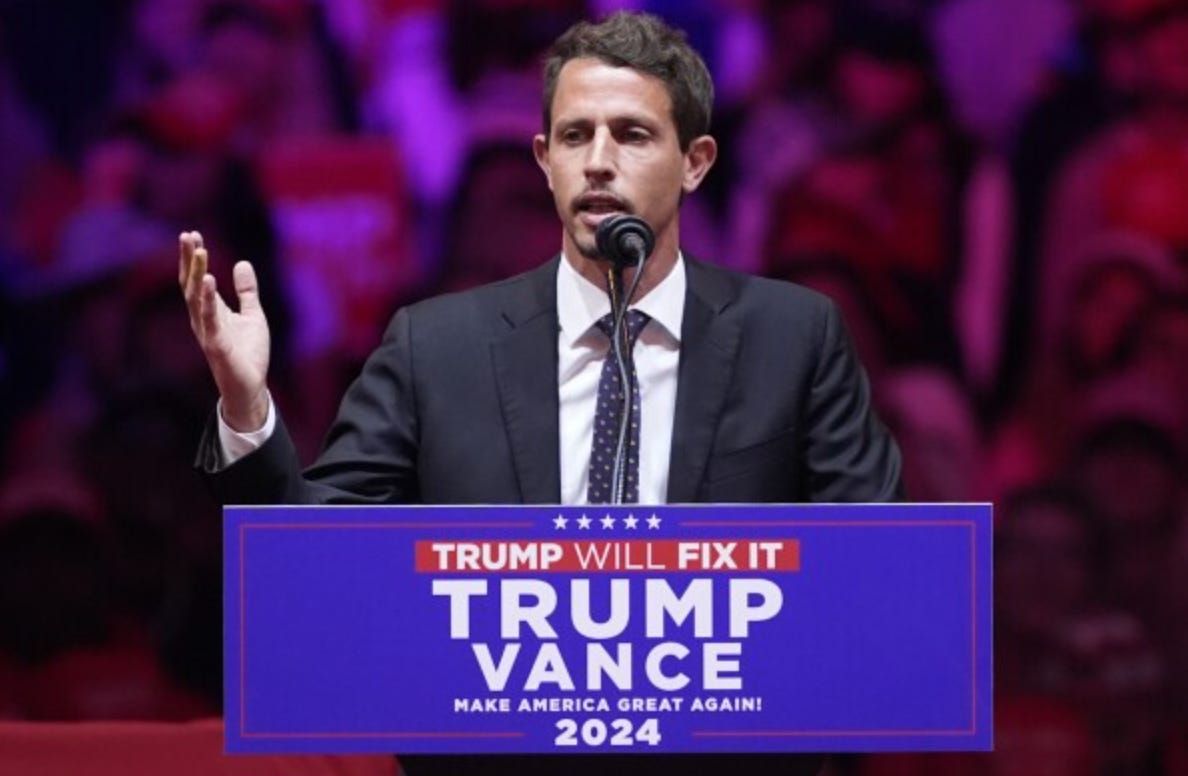Alright, I guess we’re all talking about Tony Hinchcliffe now. I’ll give it a go. I’ve never found him funny. That’s subjective. He’s allowed to be unfunny, I also find him bigoted and offensive. Honestly, agreeing to perform at a Trump rally in the first place tells me all I need to know. That he managed to go too far even for that crowd, well it’s kind of amazing.
But, let’s put that aside. What about his defense? They’re just jokes! He says he makes it a policy not to apologize for jokes, and he accuses his detractors of not having a sense of humor.
A comedian of all people should know they’re not just jokes. Who is the butt of the joke? What about it is funny? Do you have to hold a certain view for it to be funny? Is it just funny that you’re saying awful things? Why didn’t you say the awful things about Trump then? Or about his base? About the people there in front of you? It seems kind of relevant that many of his “just jokes” were pointed at the very people that Trump’s very non-jokey policies and vitriol is often aimed at.
Why did the late great Don Rickles seem to get away with what Tony Hinchcliffe does not? Several reasons; it’s not totally irrelevant that it was a different time, but that isn’t the whole picture. Rickles was clearly doing his best to pick on everyone, doing it to their face. He would go into his audience and talk to people and then make jokes about the people he was talking to. The character was clear, as was the affection. Also, he was Jewish himself, a group that knows a thing or two about oppression. And he was funny. Yeah, that’s a huge part of it. Don Rickles was actually funny.
They’re not just jokes. Through stand up we can lift people up. Tony is only lifting up people that look and think like him, and he’s doing more to put people down. We can express our fears. He’s expressing xenophobic fears of anyone different than himself. We can can challenge the status quo. Tony is mocking progressive values and very much defending the status quo. And if you’re with him on all these points, I think you’re an awful person but that doesn’t change the fact that they’re not just jokes. There is a point of view and a set of values to jokes, especially topical jokes, and to say “They’re just jokes” is an insult to the memory of Richard Prior, Dick Gregory, Lenny Bruce, and oh so many more.
Charlie Chaplin’s jokes championed the working poor and the dignity and basic quality of life they deserved. There’s a reason he is the most remembered comedian of his day, maybe the most remembered of all time, and it’s not because they were just jokes.
Not to say there aren’t jokes that are just jokes. I love a good dumb joke, what we’ve come to call dad jokes. These don’t have a group of people as the butt of the joke. These aren’t told by people looking down at those with less privilege than themselves. And jokes that are just jokes don’t have to be dumb, they can be brilliant. If you want to write just jokes, write just jokes. It’s hard. Dimitri Martin and Stephen Wright are both amazing at this, as was the late Mitch Hedberg. I am a fan of all three. Absurdity, misdirection, slapstick, are all valid forms of humor, but doing clearly topical material and trying to play it off as meaningless silly jokes, as just jokes, is bullshit.
There is value in outrage. You want to see someone saying things that are actually brave, and envelope pushing and sure to cause outrage? Check out Sammy Obeid, Maria Bamford, Hari Kondabolu (Hari’s got a great documentary called The Problem with Apu about the Simpson’s problematic Kwik-E-Mart clerk that takes a thorough look at the problem of “It’s just a joke.”) Marcella Arguello once told a joke about a customer at the bank she worked at asking to talk to her manager, and the terror it struck in her because the customer was a white guy. That joke enters my head every time I find myself getting frustrated as I interact with people at their place of business. It gave me an insight to her experience that challenged me and affected me, that changed me, while also making me laugh really hard.
They’re not just jokes. Blackface wasn’t just a joke. It was a clear expression of racism, and constant belittling and ridiculing of an oppressed people, and I have to mention it every time this conversation comes up because it shows that this argument is not new. Blackface performers, including Jolson, fought hard not to let this “just joke” of theirs go. They felt censored, and cancelled, because values changed and their “just jokes” reflected a set of values that were increasingly, and rightfully, seen as repugnant.
I’ve loved watching Sarah Silverman evolve as a comedian and as a person over the years. Her apology to Paris Hilton says so much about what a joke can mean, and that it’s okay to apologize when you miss.
Thanks for reading. I’ve written about punching up and punching down more specifically, you can read about that here if you’re interested: https://standup101.substack.com/p/punching-up-punching-down





Thank you for writing this!!! 👏🏽
dear keith,
thank you for sharing this, especially the sarah silverman apology to paris hilton. i hadn't heard about that and i really like it.
love
myq